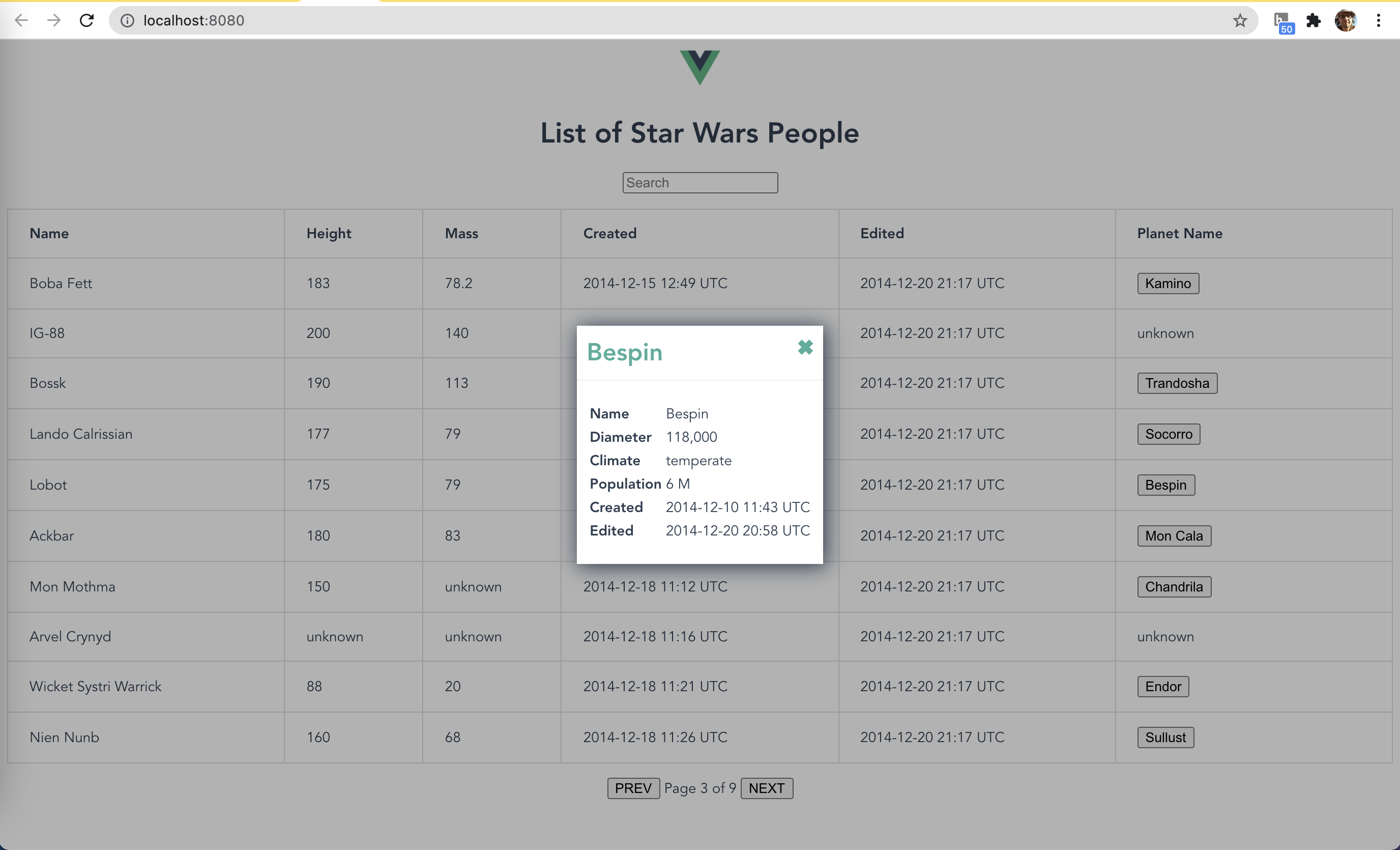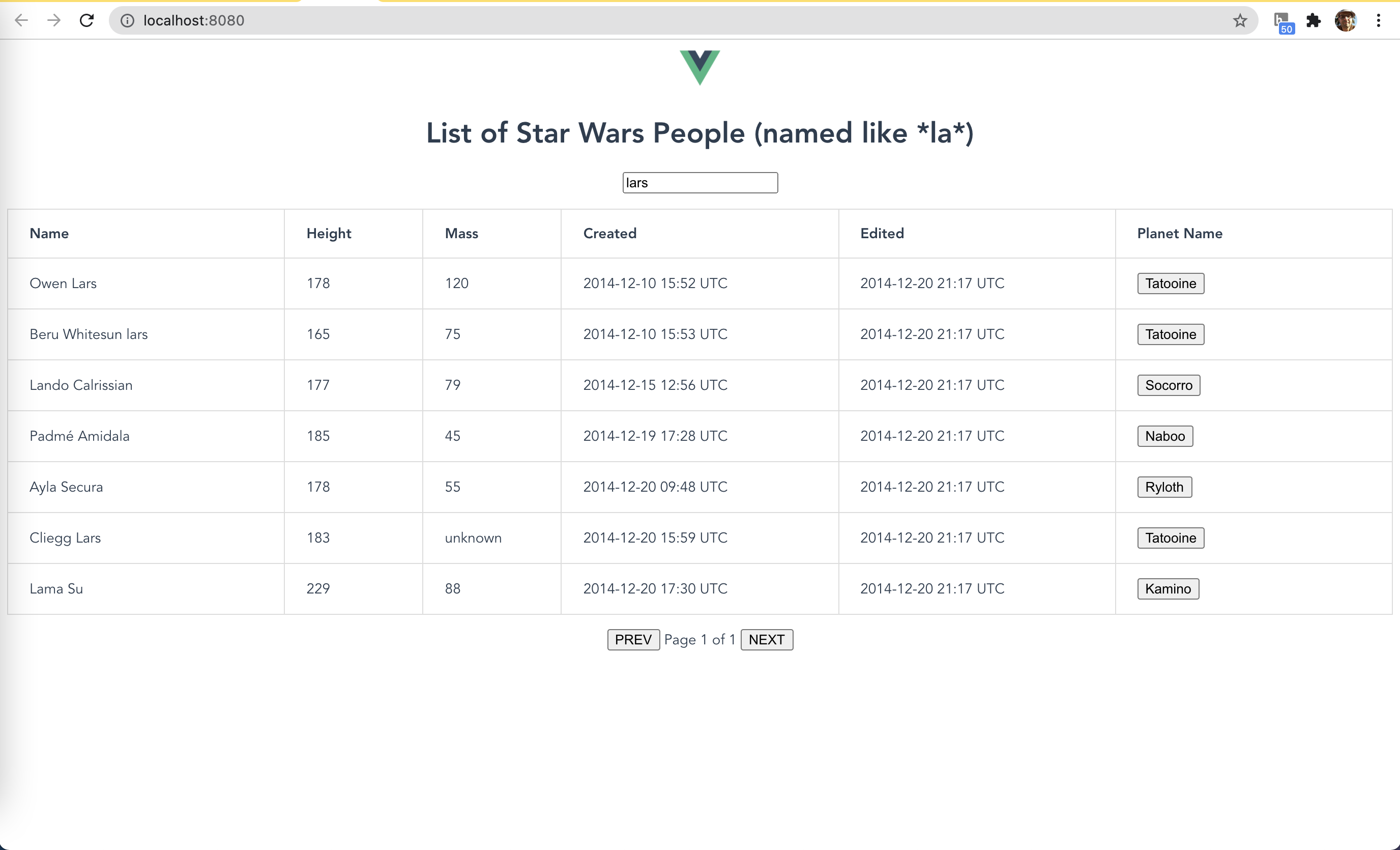Your mission, should you choose to accept it, is to create a one-page application with a list of people and the details about their related home planet.
The list of people and the information related to a planet can be accessed using the swapi api:
SWAPI api details: https://swapi.dev/
The candidate should implement a table that contains a list of users with the following columns:
- Name
- Height
- Mass
- Created
- Edited
- Planet Name
When the user clicks on the planet name link a popup is displayed showing the following information regarding the planet:
- Name
- Diameter
- Climate
- Population
The user should be able to sort the table by each column. The user should also be able to filter by searching the person's name.
Stack
- Any modern frontend framework (preferably Vue.js)
- A state management system like Redux, Vuex, or similar
Nice to have
- Some form of caching to make API calls less "spammy"
I created the project with $ vue create andrea-ercolino and renamed the root folder to AndreaErcolino.
- The text of the challenge is a bit misleading: the first appearance of users should be people. All other usages are OK
- This is a classical example where the API could be externally improved by having a piece of middleware do the drill beforehand (for example, attaching to the list of people in the current page a separate list of unique planets referenced by those people), instead of letting the frontend do it
- That could also be bettered by populating people with their planet data, maybe using GraphQL
-
The endpoint
GET /api/people/<personId>returns a JSON response like this:{ "name": "Luke Skywalker", "height": "172", "mass": "77", "hair_color": "blond", "skin_color": "fair", "eye_color": "blue", "birth_year": "19BBY", "gender": "male", "homeworld": "https://swapi.dev/api/planets/1/", "films": [ "https://swapi.dev/api/films/1/", ... ], "species": [], "vehicles": [ "https://swapi.dev/api/vehicles/14/", ... ], "starships": [ "https://swapi.dev/api/starships/12/", ... ], "created": "2014-12-09T13:50:51.644000Z", "edited": "2014-12-20T21:17:56.891000Z", "url": "https://swapi.dev/api/people/1/" } -
The response to
GET /api/people/<personId>shows that we are meant to display columns data straight fromname,height,mass,created, andeditedproperties- As for the
Planet Namecolumn, we are meant to select thehomeworldURL, make a request to the endpointGET /api/planets/<planetId>/, extract the planet's name, and finally display it
- As for the
-
The endpoint
GET /api/planets/<planetId>/returns a JSON response like this:{ "name": "Tatooine", "rotation_period": "23", "orbital_period": "304", "diameter": "10465", "climate": "arid", "gravity": "1 standard", "terrain": "desert", "surface_water": "1", "population": "200000", "residents": [ "https://swapi.dev/api/people/1/", ... ], "films": [ "https://swapi.dev/api/films/1/", ... ], "created": "2014-12-09T13:50:49.641000Z", "edited": "2014-12-20T20:58:18.411000Z", "url": "https://swapi.dev/api/planets/1/" } -
The response to
GET /api/planets/<planetId>/shows that we are meant to display data straight fromname,diameter,climate, andpopulationproperties.- We are not required to display data of the
createdandeditedproperties here. For uniformity, I'm going to display them here too.
- We are not required to display data of the
-
The endpoint
GET /api/peoplereturns a JSON response like this:{ "count": 82, "next": "https://swapi.dev/api/people/?page=2", "previous": null, "results": [ ... ] } -
The endpoint
GET /api/planetsreturns a JSON response like this:{ "count": 60, "next": "https://swapi.dev/api/planets/?page=2", "previous": null, "results": [ ... ] } -
From the responses above we understand that all lists are paginated in the same fashion (which is also very common worldwide)
-
The number of results per page is 10
- I'll download the first page of people with
GET /api/people - I'll add a Prev / Next couple of buttons, to navigate pages, according to
previousandnextproperties - I'll add a message to help user orientation, like: Page 3 of 8
- For all people in the current page, I'll display their data
- If the planet of a person is yet to be requested
- I'll request it with
GET /api/planets/<planetId>/ - I'll display a loading indicator meanwhile
- I'll display an error indicator, if the request failed
- I'll request it with
- Downloaded data will be kept in the store, so that the user will be able to navigate back and forth without issuing unneeded requests
- There are only 60 planets, which means only 6 requests to
GET /api/planetsto download them all beforehand - I won't go this way because the previous one won't make the user wait indefinitely before being able to interact
- And if we were to do for star ships, vehicles, ... the same we did for planets, the UX would be richer but not slower
I won't implement this requirement because sorting paginated results without an API, which allows that with a modifier, is painful.
In fact, paginated results means hold partial results, while sorted results implies hold all results. Given that I decided to match paginated display to paginated download, the only possible solution to sorting in the browser would require to download all pages, which defeats the pagination concept. Anyway, I can think of these alternative solutions:
- I allow to sort only after the user has managed to manually navigate through all the pages (and download all the results)
- I allow to sort immediately but I start a full navigation under the hood to download missing results, and (choose one):
- the user keeps waiting until all the results came in, then eventually sees the first page of the sorted results
- the user always sees the first page of the sorted but partially downloaded results, until no more results come in
The manual full download is not friendly, because it forces the user to do something that could be automated.
The automatic full download is not friendly, because it forces the user to wait all the time we avoided with pagination.
If I had to choose, I would implement the automatic download with incremental sort (2.2 above), but I'm not that convinced because it can be confusing for the user to see all that movement in the items of the first page and that's quite a bit of added complexity, which I don't feel comfortable to implement without talking it through before.
I see that there is a modifier for the GET /api/people endpoint which allows to search people by name.
Example: GET /api/people/?search=sky
-
response
{ "count": 3, "next": null, "previous": null, "results": [ { "name": "Luke Skywalker", ... }, { "name": "Anakin Skywalker", ... }, { "name": "Shmi Skywalker", ... } ] } -
Also these results are paginated (as expected)
After installing Axios and Vuex, NPM has detected 47 vulnerabilities (19 moderate, 28 high). See dev-documents/audit.txt.
After inspecting that report, I decide to ignore the issue because all of the vulnerabilities only affect dev dependencies.
Here are a couple of screenshots.
Notice:
- Page 3 of 9
- Population is expressed in millions
- Diameter is localized to en-US
- Created, Edited are formatted
Notice:
- Search contains lars but the results are for la
I wrote (and passed) all the tests that I wanted to write, except 4 tests that I left as TODO.
I had installed some packages to help me tests my components.
"@testing-library/jest-dom": "^5.14.1",
"@testing-library/vue": "^5.8.2",
"@vue/vue2-jest": "^27.0.0-alpha.2",Eventually I decided to not test them.
While I see the need for testing components if I was to release them, here it would make much more sense to test the app E2E.
npm installnpm run servenpm run buildnpm run lintnpm run test
